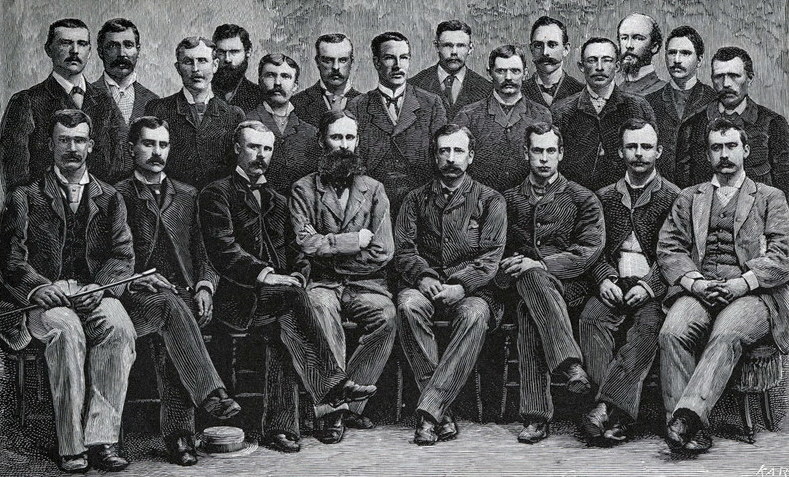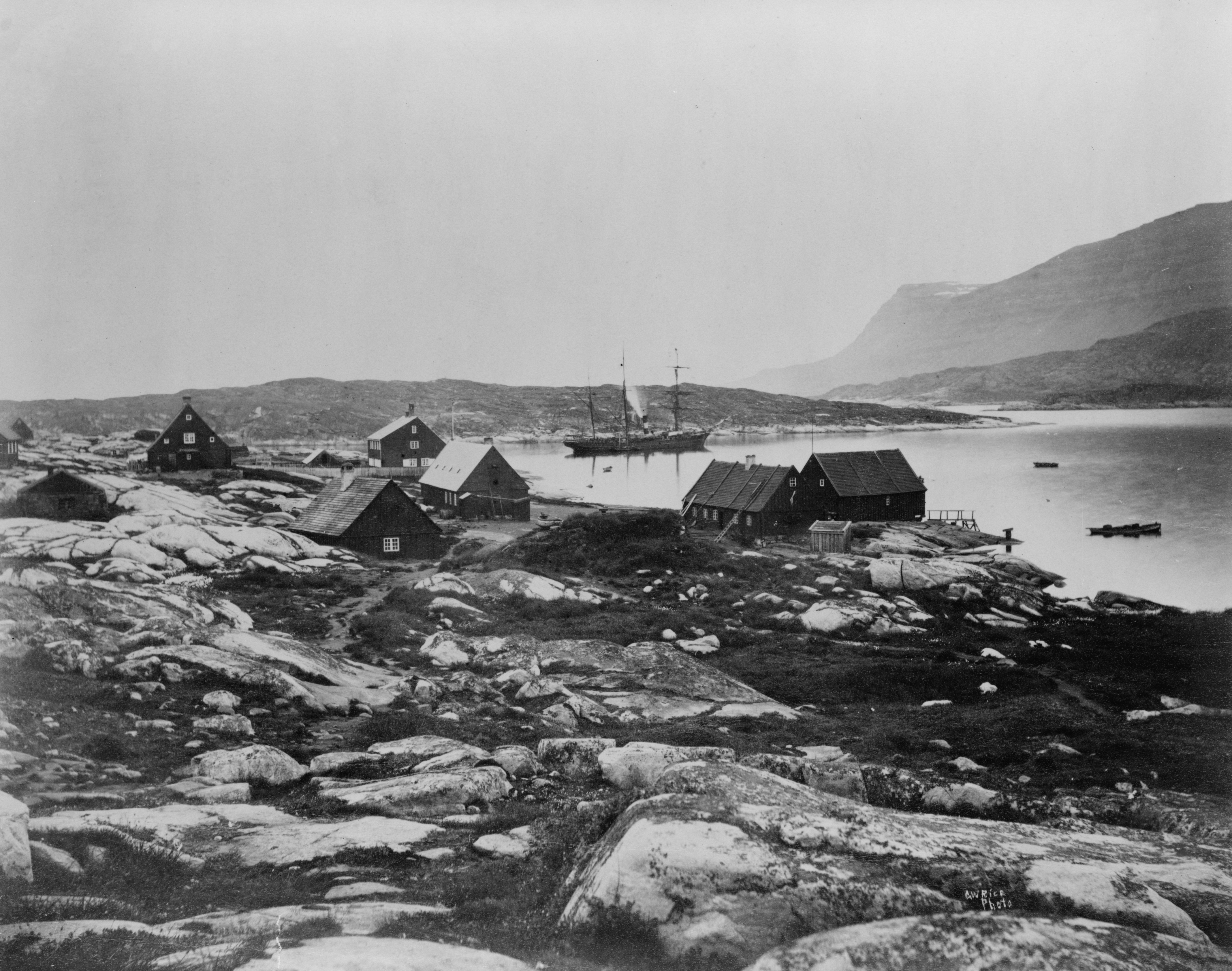Greely Expedition on:
[Wikipedia]
[Google]
[Amazon]
*
 The Lady Franklin Bay Expedition of 1881–1884 to Lady Franklin Bay on
The Lady Franklin Bay Expedition of 1881–1884 to Lady Franklin Bay on
 The Lady Franklin Bay Expedition was led by Lieutenant
The Lady Franklin Bay Expedition was led by Lieutenant
 In the summer of 1883, in accordance with his instructions for the case of two consecutive relief expeditions not reaching Fort Conger, Greely decided to head South with his crew. It had been planned that the relief ships should depot supplies along the Nares Strait, around
In the summer of 1883, in accordance with his instructions for the case of two consecutive relief expeditions not reaching Fort Conger, Greely decided to head South with his crew. It had been planned that the relief ships should depot supplies along the Nares Strait, around
Frederick Hadley Journal, Surgeon on the ''Neptune''
at Dartmouth College Library
Charles S. McClain diary excerpts
at Dartmouth College Library
P.W. Johnson Diary
at Dartmouth College Library
PBS: Abandoned in the Arctic
{{Authority control 19th century in the Arctic 1881 in Canada 1882 in Canada 1883 in Canada 1884 in Canada Arctic expeditions Incidents of cannibalism North American expeditions
 The Lady Franklin Bay Expedition of 1881–1884 to Lady Franklin Bay on
The Lady Franklin Bay Expedition of 1881–1884 to Lady Franklin Bay on Ellesmere Island
Ellesmere Island ( iu, script=Latn, Umingmak Nuna, lit=land of muskoxen; french: île d'Ellesmere) is Canada's northernmost and List of Canadian islands by area, third largest island, and the List of islands by area, tenth largest in the world. ...
in the Canadian Arctic
Northern Canada, colloquially the North or the Territories, is the vast northernmost region of Canada variously defined by geography and politics. Politically, the term refers to the three territories of Canada: Yukon, Northwest Territories and N ...
was led by Lieutenant Adolphus Greely, and was promoted by the United States Army Signal Corps. Its purpose was to establish a meteorological-observation station as part of the First International Polar Year, and to collect astronomical and magnetic data. During the expedition, two members of the crew reached a new Farthest North record, but of the original twenty-five men, only seven survived to return.
The expedition was under the auspices of the Signal Corps at a time when the Corps' Chief Disbursements officer, Henry W. Howgate
Henry Williamson Howgate (March 24, 1835 – June 1, 1901) was an American Army Signal Corps officer and Arctic explorer who embezzled over $133,000 from the U.S. Government. He escaped custody while on trial and evaded the Secret Service an ...
, was arrested for embezzlement
Embezzlement is a crime that consists of withholding assets for the purpose of conversion of such assets, by one or more persons to whom the assets were entrusted, either to be held or to be used for specific purposes. Embezzlement is a type ...
. However, that did not deter the planning and execution of the voyage.
Expedition
First year, 1881
 The Lady Franklin Bay Expedition was led by Lieutenant
The Lady Franklin Bay Expedition was led by Lieutenant Adolphus W. Greely
Adolphus Washington Greely (March 27, 1844 – October 20, 1935) was a United States Army officer and polar explorer. He attained the rank of major general and was a recipient of the Medal of Honor.
A native of Newburyport, Massachusetts an ...
of the Fifth United States Cavalry, with astronomer Edward Israel and photographer George W. Rice among the crew of twenty-one officers and men. They sailed on the ship ''Proteus'' and reached St. John's, Newfoundland
Newfoundland and Labrador (; french: Terre-Neuve-et-Labrador; frequently abbreviated as NL) is the easternmost province of Canada, in the country's Atlantic region. The province comprises the island of Newfoundland and the continental region ...
, in early July 1881. At Godhavn, Greenland, they picked up Jens Edward Jens may refer to:
* Jens (given name), a list of people with the name
* Jens (surname), a list of people
* Jens, Switzerland, a municipality
* 1719 Jens, an asteroid
See also
* Jensen (disambiguation)
* Jenssi
Joensuu (; krl, Jovensuu; ) i ...
and Thorlip Frederik Christiansen, two Inuit dogsled drivers, as well as physician Octave Pierre Pavy and Mr. Clay who had continued scientific studies instead of returning on ''Florence'' with the remainder of the 1880 Howgate Expedition.
''Proteus'' arrived without problems at Lady Franklin Bay by August 11, dropped off men and provisions, and left. In the following months, Lieutenant James Booth Lockwood and Sergeant David Legge Brainard
David Legge Brainard (December 21, 1856 – March 22, 1946) was a career officer in the United States Army. He enlisted in 1876, received his officer's commission in 1886, and served until 1919. Brainard attained the rank of brigadier genera ...
achieved a new Farthest North record at , off the north coast of Greenland. Unbeknownst to Greely, the summer had been extraordinarily warm, which led to an underestimation of the difficulties which their relief expeditions would face in reaching Lady Franklin Bay in subsequent years.
Second year, 1882
By summer of 1882, the men were expecting a supply ship from the south. ''Neptune'', laden with relief supplies, set out in July 1882 but, cut off by ice and weather, Captain Beebe was forced to turn around prematurely. All he could do was leave some supplies atSmith Sound
Smith Sound ( da, Smith Sund; french: Détroit de Smith) is an uninhabited Arctic sea passage between Greenland and Canada's northernmost island, Ellesmere Island. It links Baffin Bay with Kane Basin and forms part of the Nares Strait.
On the ...
in August, and the remaining provisions in Newfoundland, with plans for their delivery the following year.
On July 20, Pavy's contract ended, and Pavy announced that he would not renew it, but would continue to attend to the expedition's medical needs. Greely was incensed, and ordered the doctor to turn over all his records and journals. Pavy refused, and Greely placed him under arrest. Pavy was not confined, however Greely claimed he intended to court-martial
A court-martial or court martial (plural ''courts-martial'' or ''courts martial'', as "martial" is a postpositive adjective) is a military court or a trial conducted in such a court. A court-martial is empowered to determine the guilt of memb ...
him when they returned to the United States.
Third year, 1883
In 1883, new rescue attempts by ''Proteus'', commanded by LieutenantErnest Albert Garlington
Ernest Albert Garlington (February 20, 1853 – October 16, 1934) was a United States Army general who received the Medal of Honor during the Indian Wars.
Early life and education
Garlington was born in Newberry, South Carolina to Albert Creswe ...
, and ''Yantic'', commanded by Commander Frank Wildes, failed, with ''Proteus'' being crushed by pack ice.
 In the summer of 1883, in accordance with his instructions for the case of two consecutive relief expeditions not reaching Fort Conger, Greely decided to head South with his crew. It had been planned that the relief ships should depot supplies along the Nares Strait, around
In the summer of 1883, in accordance with his instructions for the case of two consecutive relief expeditions not reaching Fort Conger, Greely decided to head South with his crew. It had been planned that the relief ships should depot supplies along the Nares Strait, around Cape Sabine
Cape Sabine is a land point on Pim Island, off the eastern shores of the Johan Peninsula, Ellesmere Island, in the Smith Sound, Qikiqtaaluk Region, Nunavut, Canada.
History
The cape was named after Arctic explorer
Arctic exploration is the ...
and at Littleton Island
The Littleton Islands, ( Greenlandic: ''Pikiuleq'') are a group of two small coastal islands, the largest of which is Littleton Island. They are located in the Avannaata municipality, off NW Greenland.
Geography
Littleton is a group of two rock ...
, if they were unable to reach Fort Conger, which should have made for a comfortable wintering of Greely's men. But with ''Neptune'' not even getting that far and ''Proteus'' sunk, in reality only a small emergency cache with 40 days worth of supplies had been laid at Cape Sabine by ''Proteus''.
When arriving there in October 1883, the season was too advanced for Greely to either try to brave the Baffin Bay
Baffin Bay ( Inuktitut: ''Saknirutiak Imanga''; kl, Avannaata Imaa; french: Baie de Baffin), located between Baffin Island and the west coast of Greenland, is defined by the International Hydrographic Organization as a marginal sea of the Arct ...
to reach Greenland with his small boats, or to retire to Fort Conger, so he had to winter on the spot.
Fourth year, 1884
In 1884, Secretary of the Navy,William E. Chandler
William Eaton Chandler (December 28, 1835November 30, 1917), also known as Bill Chandler, was a lawyer who served as United States Secretary of the Navy and as a U.S. Senator from New Hampshire. In the 1880s, he was a member of the Republican "H ...
, was credited with planning the ensuing rescue effort, commanded by Cdr. Winfield Scott Schley. While four vessels—, , , and ''Loch Garry''—made it to Greely's camp on June 22, only seven men had survived the winter. The rest had succumbed to starvation, hypothermia, and drowning, and one man, Private Henry, had been shot on Greely's order for repeated theft of food rations. Of the seven rescued, Joseph Elison died on July 8th following multiple amputations. The relief party arrived at St. John's, Newfoundland on July 17, 1884 from which the news was telegraphed throughout the States, and a sketched portrait of the members of the Greely Expedition, both living and dead, was published. After a stay of ten days the ships left for New York.
The surviving members of the expedition were received as heroes. A parade attended by thousands was held in Portsmouth, New Hampshire
Portsmouth is a city in Rockingham County, New Hampshire, United States. At the 2020 census it had a population of 21,956. A historic seaport and popular summer tourist destination on the Piscataqua River bordering the state of Maine, Portsmou ...
. It was decided that each of the survivors was to be awarded a promotion in rank by the Army, although Greely reportedly refused.
Controversy
Rumors ofcannibalism
Cannibalism is the act of consuming another individual of the same species as food. Cannibalism is a common ecological interaction in the animal kingdom and has been recorded in more than 1,500 species. Human cannibalism is well documented, b ...
arose following the return of the corpses. On August 14, 1884, a few days after his funeral, the body of Lieutenant Frederick Kislingbury, second in command of the expedition, was exhumed and an autopsy was performed. The finding that flesh had been cut from the bones appeared to confirm the accusation. However, Greely and the surviving crew denied knowledge of cannibalism, and it was surmised some members were trapping sea-lice for food and needed meat for bait.
References
Footnotes
Bibliography
* * * * *External links
* * *Frederick Hadley Journal, Surgeon on the ''Neptune''
at Dartmouth College Library
Charles S. McClain diary excerpts
at Dartmouth College Library
P.W. Johnson Diary
at Dartmouth College Library
PBS: Abandoned in the Arctic
{{Authority control 19th century in the Arctic 1881 in Canada 1882 in Canada 1883 in Canada 1884 in Canada Arctic expeditions Incidents of cannibalism North American expeditions